In this episode of “Reimagine Rural,” host Tony Pipa visits DeWitt, Arkansas, deep in the Mississippi Delta, where a failed biofuel project sparked a shift in the community’s economic identity. Entrepreneurs share the stories of how their small businesses got off the ground and what their plans are for their future and the future of DeWitt.
Get more research about rural policy here.
We’re gratified to have heard from many of you about your own town and the positive things happening there. Feel free to send a note about your rural town to [email protected]. We’d love to hear from you.
Participants in this episode:
- Chandler Boyd-Mathews, executive manager, Boyd Farmhouse Inn, DeWitt
- Tami Hornbeck, owner, HBK Farms; owner, 420 & Turnrow, DeWitt
- Ines Polonius, CEO, Communities Unlimited, Fayetteville
- Bobby Webb, founder and owner, Webb’s Sporting Goods, DeWitt
- Listen to Reimagine Rural on Apple, Spotify, or wherever you like to get podcasts.
- Learn about other Brookings podcasts from the Brookings Podcast Network.
- Sign up for the podcasts newsletter for occasional updates on featured episodes and new shows.
- Send feedback email to [email protected].
TRANSCRIPT
[music]
BOYD-MATHEWS: Family ties has always been a big draw for me. My family’s all here. I still have my grandparents—they’re 86 years old. But not just that. There is just a potential for DeWitt that a lot of people, especially young people, do not see, where we do have kind of a unique geographical area and a unique kind of setting where and businesses where you could grow. And I think a lot of the younger generation are going away and not coming back and really capitalizing on it.
PIPA: That’s Chandler Boyd-Mathews, the 27-year-old executive manager of the Boyd Farmhouse Inn, explaining why he returned home to DeWitt, Arkansas, after college to play a leading role in getting this new family-owned hotel built and up and running. Such entrepreneurial energy is central to this episode of “Reimagine Rural,” as you’ll hear how local businesses are at the heart of helping DeWitt adapt to the changes that have affected its downtown and its overall economy.
I’m Tony Pipa, a senior fellow in the Center for Sustainable Development at the Brookings Institution, and your host for Reimagine Rural, this podcast where I visit different places across rural America that are making progress on their efforts to thrive or renew themselves amid economic and social change.
I’ve been gratified to hear from many of you about your own town and the positive things happening there. Feel free to send me a note about your rural town at GlobalMedia at Brookings dot edu. I’d love to hear from you.
Here in the U.S., we celebrate entrepreneurs, seeing them as emblematic of the American dream. Yet we don’t generally associate entrepreneurship with rural places.
Entrepreneurship, however, is becoming part of the lifeblood of DeWitt, a town of about 3,000 in the Arkansas Delta, a little more than 80 miles southeast of Little Rock. DeWitt is actually one of two county seats of Arkansas County in the flat plains of the Delta that are home to the largest rice-growing region in the United States.
[music]
My visit to DeWitt showed me not only that rural entrepreneurship is alive and well, it’s crucial to sustaining the town’s future—and it also has its own characteristics, which are a bit different from the unicorn companies that venture capitalists are hoping to cash in on.
Our story begins, as most good stories about entrepreneurs usually do, with … failure.
POLONIUS: It was a renewable energy conference and there was an assistant instructor from the community college in DeWitt who came up to me afterward and said, We’ve been working on this bioenergy crop to see if it would work in the region, and I think it would work really well for this model.
PIPA: That’s Ines Polonius, who you first heard in episode three when we talked about federal rural policy. Ines is the CEO of Communities Unlimited, which helps provide entrepreneurship support and capital, and works with communities across seven states in the South to help them build and execute strategies for improving their prosperity.
Agriculture is a cornerstone of DeWitt’s economy. The town is surrounded by flat fields that are still mostly family-owned farms. The biofuel idea that emerged from the community college was seeking to leverage those local assets. Here’s Ines on what happened next.
POLONIUS: He invited me to a meeting with the then mayor, Ralph Relyea, and suddenly a whole host of folks showed up at the community college, and I did the same thing—I presented the model to them. They told me a little bit about the crop and what they were doing with it. And quite frankly, bioenergy was like the furthest from my mind, but it was so exciting.
And this was the meeting when the mayor infamously said, We lost our shoe manufacturer, I don’t want another business with 400 jobs. I would much rather have ten businesses with ten and 15 jobs so that if I lost one, I still have the nine others and all the jobs with that.
And that to us was such a clear sign that this community was ready to reinvent itself in a whole new way.
PIPA: Now, as luck would have it, about six months later another company would take over that shoe manufacturing space with a contract to make military boots and replace those jobs. But the impetus to diversify the local business base with new ideas had already taken hold.
POLONIUS: So, the value chain project really started with a group of farmers who had an interest in growing this crop. We very intentionally engaged a former USDA technical assistance provider because he had such good connectivity to the Black farmer community, because we wanted to let all farmers be aware of this potential new crop and include them right from the get-go.
We knew that the crop would be very seasonal, and that we needed to build out these businesses in this value chain to run all year long. And so, we began to look at waste vegetable oil from the restaurants within about a 50 mile radius of DeWitt. It turned out that the city ended up investing in this and the city created the jobs to collect this waste vegetable oil because they had a keen interest to keep the waste vegetable oil out of the pipes, out of the sewage pipes, as well as the central waste wastewater system.
So, now we had two products that we could turn into biofuel. We ordered the very first refinery. If you see it in DeWitt, it’s the size of a washing machine. And again, the whole idea was that we wanted to start small. We didn’t want to invest hundreds and thousands of dollars before we could prove out the product.
PIPA: The group did targeted research to ensure that the market would be there for the biofuel.
POLONIUS: We wanted to be certain that there was demand for the biofuel. And we actually talked to Valero—they have a facility in Memphis and they were ready to buy, but only by the tractor trailer load, which would take us a while to produce that kind of volume. So, we knew we had the big volume. Then we went back to the city and said, who would use it locally so that we could begin to develop that market?
[music]
It was the farmers. The farmers were so eager to use a locally produced fuel in their equipment. And that was really what convinced us that we could move forward with the whole model.
PIPA: In the end, however, the growing season proved inhospitable, and the changes involved in successfully cultivating a new crop were too complicated. Tami Hornbeck, a farm and business owner in DeWitt, was also involved in the project.
HORNBECK: Well, I’ve grown up DeWitt all of my life. Fourth generation of our families that have lived here and been in agriculture, because that’s the main driver of our economy here in DeWitt.
My husband and I own HBK Farms and we farm a few acres, but our son farms the rest of it. So, we are still involved with agriculture. We had a seed business for 30 years and developed soybean technology and varieties that we grow here in our area in the mid-South. And grew that business and worked with farmers on a daily basis and knew knew their culture and their needs.
PIPA: Given Tami’s experience with seeds, she explains what happened.
HORNBECK: We had several farmers that planted this experimental crop in our area because it doesn’t normally grow in our area and farmers were not familiar with it. And so, we tried out a few acres to see how it did. And it just it didn’t it didn’t really fit in with our climate here as well.
[music]
And with the the other row crops, it was really hard to introduce a crop that didn’t have a market already established. The systems that the farmers are currently working in, there are certain seeds that are planted, they’re booked early. They know the fertilizers. They know, you know, all of the inputs that they are going to need and in including the fuel and the equipment. And so, with the camelina it was totally different because the seed size was much smaller than they were used to. So, they didn’t have the proper equipment or storage for that type of seed.
PIPA: From Ines Polonius’s perspective, however, the project was far from being a failure. It was a catalyst for stimulating everyone involved to think about what might be possible.
POLONIUS: They had one sort of pilot season. They had one very strong season. And then what we started seeing was way too much rain during that window when the plant bolts and produces the seed. And so, the farmers tried it for two, some of them tried it for three years and finally decided that there just wasn’t a window during which they could grow the crop.
There was still some refining of the waste vegetable oil that was done, but really then the true market opportunity was gone and we had to retool. And we brought the whole team together and said, What do we do with this? Because we had clearly shifted the mindset in the community from a, Oh, woe is us, you know, we’re declining, there’s nothing going on here to there are entrepreneurs who stepped into this value chain wholeheartedly—
[music]
—including one gentleman who invested a lot of his own money to really refurbish the old Exxon station into a new restaurant, into a feed store. And that that got a lot of attention.
PIPA: Tami Hornbeck came out of that experience and decided to open up a coffee shop downtown. Called 420 & Turnrow, it simultaneously has an artsy and cozy feel. Tami explains the meaning of the name.
HORNBECK: Turnrow is where farmers come when they get to the end of a row on their tractor, if they need to meet up with family for lunch or to discuss something, they meet up at the end of the turnrow. And 420 is our address on the court square.
That was one of our main goals and values in starting the coffee shop, was to source as much as we could locally and support other entrepreneurs and maybe home businesses and cottage businesses to be able to help those entrepreneurs get their product out there.
So, in our coffee shop, we have a local baker who does all of our baked goods. We recently introduced an entrepreneur who has a spice and and dip mix line. We have a local farmer who provides lettuce and tomatoes and produce for us, as well as another farmer where we get our ground beef for different recipes and items that we have on our menu.
We also carry Loblolly Ice Cream, which is a company out of Little Rock. We have a native beer permit, so we have Arkansas beer. And so, we we have a good variety. And we just tried to expose our small community with other things in Arkansas.
PIPA: The coffee shop is on the court square, which is home to a historic art deco courthouse. 420 & Turnrow is one of several new bushiness there, and Tami is also investing in other ventures.
HORNBECK: Well, it’s a historic district. It’s actually on the historic register with several contributing buildings. And it’s the original square that was there from the since its conception. It has a courthouse in the middle and the pavement is on the court square is actually concrete, the original concrete that was put down on top of the dirt. So, we went from horse and buggy to the paved court square that we have now.
With our other properties, we have office space that we rent out. We also have a community event center that, it’s an old building built probably around 1960 that we can have music events, people rent out for wedding receptions, and other parties, and things to be able to offer a space in our community that has … it’s equipped with what’s needed to host something and then it has the charm of an old building.
The florist was recently purchased by a young lady and her family.
[music]
And then we have a dress shop that is … was recently purchased by two sisters that are young ladies with families. So, you just see more young people becoming involved in community leadership, being on boards, local clubs, and things like that. You just see them becoming more involved.
PIPA: There is no denying that court square is not experiencing the bustle of its past. Those businesses are bright spots amidst empty storefronts and much needed improvements in infrastructure.
But it’s also not indicative of all the entrepreneurial activity in the area. Over a mile away, Webb’s Sporting Goods has grown into a 4,000 square foot hub of the latest in outdoor gear for fishing, hunting, camping, boating—pretty much anything you can do outdoors in the Arkansas Delta. Webb’s even has its own podcast studio, where we taped several of our interviews. Meet Bobby Webb, the founder and owner of the store.
WEBB: Grew up in Possum Waller down there, and just hunted and fished all my life. Never been any kind of trouble. End up quitting school in eighth grade. I just wanted to go to work. I seen folks that had things that I liked and I just I just wanted to go to work. Grew up as poor as they get around here. I remember growing up getting $5 a week food stamps from my mother for … that was my allowance that week.
Went to work at a local Burger Master, and rode around with a buddy of mine that was a police officer—blue lights intrigued me.
PIPA: Bobby got his G.E.D. and became a cop as well, ultimately working as a narcotics officer for most of his career. It was while he was a night deputy at the jail that he learned about financing and business opportunities from a supervisor who also had a pawn shop.
WEBB: So, I go and talk to him for about 45 minutes every night, and I’m on break, and we got talking about it, and he’s the reason I got in business, and that’s kind of how I end up Webb’s Sporting Goods got started. And because of a pawn shop—a lot of people don’t know we’re still a pawn shop, we still are.
It was a long shot. Never thought it would work to the degree that it has. I remember me and my wife borrowing $10,000. And I had a bank give me that opportunity. And then me and my wife end up selling everything we had. And I tell that story all the time to people because, you know, they want they want the new truck, or they want the new bass boat, or they want the new four wheeler, but they don’t want to take sacrifices to maybe get rid of that out of their life and take that and put it into a business.
So, we ended up doing that. And I ended up coming up with about $30,000. We started a pawn shop, and within a three weeks I had done loan $17,000 out. So, we started from nothing is where I’m going with that conversation is, is we just didn’t just all of a sudden come up and Webb’s Sporting Goods appeared.
PIPA: While running and managing the pawn shop, Bobby and his wife started offering some bait.
WEBB: We started playing in bait, started buying tackle. Didn’t have no distributors, didn’t understand where to get anything from. And we just slowly started evolving into a fishing store, pretty much a bait shop, that’s … just a mom-and-pop bait shop. And we just worked our tail off.
So, after about three years I started realizing that a little bit of the fishing stuff was kind of kicking off for us, started figuring out how to get get a little bit of product. And I won’t never forget this. And it was Tink’s 69—it’s a it’s a well household name of a deer pee. Bought 50 bottles, sold it [snaps] like that. Okay? I said, oh look, I got something here.
[music]
So, we started dabbling every year off into just different things, anything hunting related. We started applying for every type of product that we could get and afford. We cashed flowed everything ourselves, because we made the money, we put it right back into the business.
PIPA: Now, in the terminology of tech start-ups, business school professors would call this a “pivot.” Bobby sensed that his real market was the people coming to take advantage of the outdoor enthusiast’s paradise that surrounds DeWitt.
WEBB: But the number one deal here is is we’re surrounded by … we got 160,000 acres of White River National Wildlife Refuge 15 minutes from here. We have the White River access 15 minutes from here. We have the Arkansas River access 15 to 20 minutes from here. We have Bayou Meto National Wildlife Refuge, it’s right here, I think it’s 33,000 acres and it’s nothing but habitat for duck.
So, all this here comes to converge with the Arkansas, Mississippi, and White River all converge here. So, all your river traffic from Oklahoma down, if you was shipping grain or steel or whatever it may be by waterways, they had to get it through to the White River to get it to the Mississippi. And so they built that the Arkansas Post Canal, which is right there by Arkansas Post, which was the national … state capitol, I think in the late 1700s.
But they built that through there and in conjunction with building that it built lakes, so it flooded water. You get Merrisach here that’s got a beautiful place down there that you can go down there and camp. It’s got 300 spots, maybe 400 spots down there. And that’s what makes us successful.
PIPA: As Bobby began to bring in more fishing and hunting gear and grow that part of the business, he also looked to expand his physical space. He was able to find a building located next to the intersection of State Highway 1 and U.S. Route 165. While these are both two-lane roads, they crisscross the Delta and experience lots of traffic.
WEBB: And I seen real quick what the traffic count was down here. So, I’ve done a state census on it, and you get the census on it, it’s on like 6.2 thousand people come through this intersection a day.
PIPA: Bobby’s sporting goods business has grown into a multi-seven figure enterprise, with major online commerce in addition to the physical retail space. Bobby points to his customer service as the secret of the store’s success.
WEBB: Every time you you have a customer come in and and they wanting this particular bottle of water or shotgun shells or or whatever it may be, we had a want list upfront and if someone come in and ask for it three times we stocked it. And to this day, that’s how Webb’s Sporting Goods got built. But it got built by a lot of hard work.
[music]
But it goes back to I’m still an old country boy from South Arkansas. I’m still going to shake your hand, I’m still going to talk to you, I’m still going to kiss babies, and I’m going to work the floor from 10 to 3, I don’t care if I got to work there at twelve o’clock at night to get my work done. That’s to me is what’s lost in most retail businesses. It’s all corporate anymore. We are a corporation, but we’re a mom and pop corp.
PIPA: The growth of Webb’s Sporting Goods, and the growth of the outdoor economy that it signified, also made the prospect of a new hotel attractive. Chandler Boyd-Mathews explains.
BOYD-MATHEWS: So, even though we are not on a main interstate like some of the other small towns, we have one of the main paths to go from central Arkansas down to Louisiana and then back up to Mississippi and Tennessee and all that. So, we’re kinda right here at a hub. And whereas a lot of people do pass through, we didn’t really have much to offer as a place to stay and people to kind of stay in the area and do things. So, the main draw as even though we had all these people passing through no one was stopping besides during a three-month period of hunting season.
So, hunters really draw in most of the profit in this area. And you see a lot of restaurants and stuff, whereas they’ll be open seven days a week during hunting season and different things, they may be open for five during the rest of the year.
PIPA: As a young man in his twenties, Chandler might seem unlikely to be an entrepreneur in his rural hometown. Like many young people from rural places, he left home to attend college. But feeling the pull of DeWitt, and seeing what was happening in the local business community, he saw himself coming back to take advantage.
BOYD-MATHEWS: So, I grew up in DeWitt and I went off for college, and went up to the University of Arkansas in Fayetteville, and had some very great teachers up there. So, I did my first year under broadcast journalism, and then I was like, Well, I don’t think it’s for me. I enjoy it, I enjoy talking to people, I enjoy the work. But I have a home in DeWitt, all my family’s here, and I kind of wanted to build my own business and be able to contribute. And I just didn’t feel like I would have that chance to really contribute if I continued down that path.
So, second year of college, that’s where I decided to switch over to business and did small business entrepreneurship, because I knew I would be—it’s a very minor major, like just a little subcategory of management. And I chose that path because I knew I was going to come back home, I was going to be opening up a business eventually. And that whereas a big multimillion dollar business can afford to do things one way, we have to keep a pretty tight lock on everything in what we do because it is such a limited area to work in.
PIPA: Chandler’s desire to start a business—and his recognition that it would need to be right-sized for DeWitt—coincided with some ideas that his aunt, who is the city attorney, had.
BOYD-MATHEWS: After about five years of being the city attorney, Christina was like, there is a serious need for a hotel and a place for people to stay. Because she saw with working with the city that there is industry coming through and a lot of people that travel through here but they don’t have a place to stay.
So, she had this idea and something she wanted to do in the community but didn’t really have an outlet to do it. So, someone to run it that she could trust and work with coinciding. And so, that’s where I came in.
[music]
So, after I switched to business and knew I was going to come back, she’s like, Well, I have this idea. It’s something that I’m passionate about and I want you to do, if you’re passionate about it, I think it’ll be a great business to bring into the community and a good place for you to start. So, I thought about it for a while and said, okay, let’s sit down, start working on this and let’s do it.
PIPA: That eventually turned into the Boyd Farmhouse Inn, located just near Webb’s Sporting Goods. Chandler oversaw the construction and opening and he serves as its executive manager. The 23-room hotel is built in the style of a modern farmhouse, with wood floors throughout and lots of natural light streaming through the windows. I can say from personal experience that it makes for a comfortable, cozy stay.
BOYD-MATHEWS: In each month we have had a hundred more guests than the previous month. So, it has been a steady increase for the first five months and I’m happy for that because that kind of lets us know, okay, we’re doing something right, people are enjoying it, and we have kind of a unique experience that we wouldn’t be able to do with a franchise because we are able to make it our own. And, just the style of it, I would say, is kind of something you wouldn’t see in just your average hotel.
PIPA: For Chandler, this enterprise feels exactly right, and it gives him a sense of fulfillment that it’s right here in DeWitt.
BOYD-MATHEWS: I’m excited to work and meet people. So, that’s just awesome that I can go, be like, this is mine, this is what I’m doing, I want to do it right. So, being able to do that every day and have kind of that sense of control and just shape my own path with DeWitt.
PIPA: For Ines Polonius, this is a promising sign for DeWitt’s future—this growth of home-grown businesses tied directly to the community.
POLONIUS: With the momentum change in DeWitt, my hope is that more young people that graduate from that community college right there in DeWitt stay in DeWitt. Because they’re smart, and there is an environment now that values them as potential entrepreneurs.
And so, first, can we find more businesses to revitalize the square, which has a long way to go? Two, are there are there a couple of tech entrepreneurs that either emerge from the local college or may have an interest in DeWitt because it’s just a cool place to live now? Are there individuals who may have left the community and have a great job, and because I know the mayor is working on a broadband strategy, might bring that job back remotely to DeWitt? And why? Because maybe their parents are there and they want to have their kids grow up in DeWitt because it’s just a great place to grow up and to enjoy the hunting in the outdoors and all the things that they enjoyed as a young person.
[music]
So, you begin to sort of see levels of opportunity that I think are possible once a community has the momentum, supports its entrepreneurs, and begins to create an environment that really values local ownership. And I know that DeWitt is there. There are enough people there that care about that community that want to see it succeed.
PIPA: For Tami Hornbeck, small businesses like hers will be the engine that drives DeWitt forward, but they are often not the priority when it comes to policy.
HORNBECK: Well, what I’ve noticed over the years with being involved, especially with a small business, a small restaurant business, is that the small businesses are the drivers of these rural economies. And I don’t think they’re given enough credit and resources to be able to stay open, because you see tax credits and and opportunities and resources like that given to large industry, but not to small businesses.
PIPA: Ines Polonius agrees—and urges state governments to shift how they think about economic development in rural places.
POLONIUS: I think we’re still focused on recruiting jobs into our southern states in most cases. The policy needs to have a “both/and” approach, where we’re putting equal resources into incentives for recruiting large employers that will probably be either in an urban area, on the outskirts of an urban area, and supporting local entrepreneurship. And that can then happen in all communities across the state.
I think the other piece of it is, are we focused at the state policy level on our rural communities, or is it an urban first approach? So, that that’s what we’re advocating in every state in which we work, from the governor to the local legislature.
PIPA: Tami Hornbeck sees potential in reviving court square, but she recognizes it will take time and public investment.
HORNBECK: Realistically, it takes, I would say, a good 5 to 10 years to actually have businesses open and thriving and prepare the infrastructure needed. Because we’re currently working with the mayor and our county judge on a renovation project for the square. They have pulled together some different individuals to form a committee to explore new sidewalks, new lighting, you know, trying to make access to businesses and being in our town square a pleasant experience.
[music]
PIPA: Can DeWitt pull people off the bypass and draw them back into downtown? Bobby Webb, who sees his location near the intersection of two major roads as a key ingredient of his success, is not so sure. One thing seems clear—the fishing, hunting, and outdoor recreation that surrounds DeWitt offer opportunity for additional economic activity. The family-owned farms are increasingly supplementing their earnings with income from the wildlife and the outdoors to make ends meet. But the town has not necessarily fully embraced the potential of that market. Here’s Bobby again.
WEBB: They depend on duck hunting and goose hunting in this area to fulfill their end of their year-end budget. I mean, that’s just it. And every farmer here, pretty much I would say 70% of them, either one or two things: they lease their property out or they hunt it and guide it thereself and own their own lodge. So, in the last 20 years, that has really came on strong.
This town is a very tight-knit town. It’s a very caring town. It’s a very giving town. I mean, if someone gets sick, there’s some people coming out of their pockets to take care of some folks. To me is our town as a whole, I don’t think we’re working together like we should. I’m being honest. If you want me to be just honest as we could, I feel like we as a sporting goods store has capitalized on the hunting and fishing, but there’s so much other stuff that could be done, whether it be guiding fishing trips. Okay? There’s not very many people doing that. But there’s so much other stuff that could be wrapped around the hunting and fishing industry here.
[music]
What I would like to see DeWitt grow is more facilitating, more for hunting and fishing and just on that aspect of it there. And we need housing. We’re like any small community. We could take a 400-person complex built back here on back 40 of this property, and let’s just say that, and fill it up tomorrow. There’s no places to stay here.
PIPA: It’s been challenging, however, to keep community members working together so closely as they did during the biofuel venture with Communities Unlimited. The busyness of business makes it difficult to juggle.
At the same time, they all agree that their businesses are not just a source of income or wealth, but inextricably linked to their community. Boyd Farmhouse Inn is already planning to open a restaurant, even though it wasn’t part of the original plan. Chandler Boyd-Mathews explains.
BOYD-MATHEWS: So, the addition of the restaurant is actually something that we did not really intend when we were building it. And it is kind of from community outreach that we have decided to go ahead and do it. So, it’s very community inspired that we are opening a restaurant in addition to the hotel. So, we built a dining area with room for around 50 people. So, not too big, but manageable for guest breakfast in the morning. And we knew that we’d have some people that rented it out for events. And we’ve had lots of private events and meetings there already that we’ve done catering for. But just through community outreach and people wanting kind of a different place to eat and go to is the reason we decided to get kind of in the restaurant business.
PIPA: Perhaps Bobby sums up this feeling best:
WEBB: You know, this is my hometown. And probably if I didn’t care about my hometown, I’d probably close this thing up three or four years ago. True story.
[music]
I’d have left here, moved this thing to Conway, Northwest Arkansas, could have done the same thing in five years and probably retire. Metropolitan area, you know as well as I do, it makes more money. I could’ve done the same thing up there. But I chose not to do that. I chose to stay here and weather the storm in a Delta community. And it’s worked. It’s worked for me and my family and my employees.
And we was approached about six months ago and for someone to buy us. And this is the first time it’s going to be heard. And I was really, really thinking they was going to buy us. I mean, it was life changing for me and my family. And I knew I was going to stay on board for a while, I know this. I mean, they told me I was going to stay on board for two years. It kind of fizzled out on us, after COVID and everybody got heavy on stuff. They kind of backed out. They’re not out of the game yet. But right now, I’m not for sale. I’m not for sale. I feel like I got another 5 or 6, 7 years maybe left in me in retail. That’ll put me 17 years in retail, 17 years as a cop.
I want to make sure this thing is left in good shape for our community. I don’t want to sell it to someone and they close it up and move it somewhere else. If they do that, I’ll stay here till I’m 90. So, I want to make sure this is good for our town. We need this in our town.
PIPA: It’s this kind of community-mindedness that often defines rural entrepreneurship. It’s brought the entrepreneurial spark to DeWitt, and has even pulled in the next generation. The extent to which those sparks continue to grow and multiply will play a big role in defining where DeWitt goes from here. Thanks for listening to their journey.
In our next episode, I’ll visit the towns of Thomas and Davis in West Virginia. I look forward to you joining me there. And remember, I’d love to hear about your story of positive change in rural America. Email me at GlobalMedia at Brookings dot edu.
[music]
PIPA: “Reimagine Rural” is a production of the Brookings Podcast Network. My sincere thanks to all the people who shared their time with me for this episode. Also, thanks to the team at Brookings who make this podcast possible, including Fred Dews, producer; Gastón Reboredo, audio engineer; Zoe Swarzenski, project manager and policy analyst; Andrew Wallace, Heinz Policy Fellow; and Emma Uebelhor, former research and project coordination intern, all at the Center for Sustainable Development at Brookings; Ian McAllister and Colin Cruickshank, who traveled with me to some of these places, captured the audio, and took great pictures and videos; Chris McKenna, who helped get the show off the ground; and the great promotions teams in the Brookings Office of Communications and the Brookings Global Economy and Development program.
Katie Merris designed the beautiful logo.
You can find episodes of “Reimagine Rural” wherever you like to get podcasts, and learn more about the show on our website at Brookings dot edu slash Reimagine Rural Podcast. You’ll also find my work on rural policy on the Brookings website.
I’m Tony Pipa, and this is “Reimagine Rural.”
The Brookings Institution is committed to quality, independence, and impact.
We are supported by a diverse array of funders. In line with our values and policies, each Brookings publication represents the sole views of its author(s).

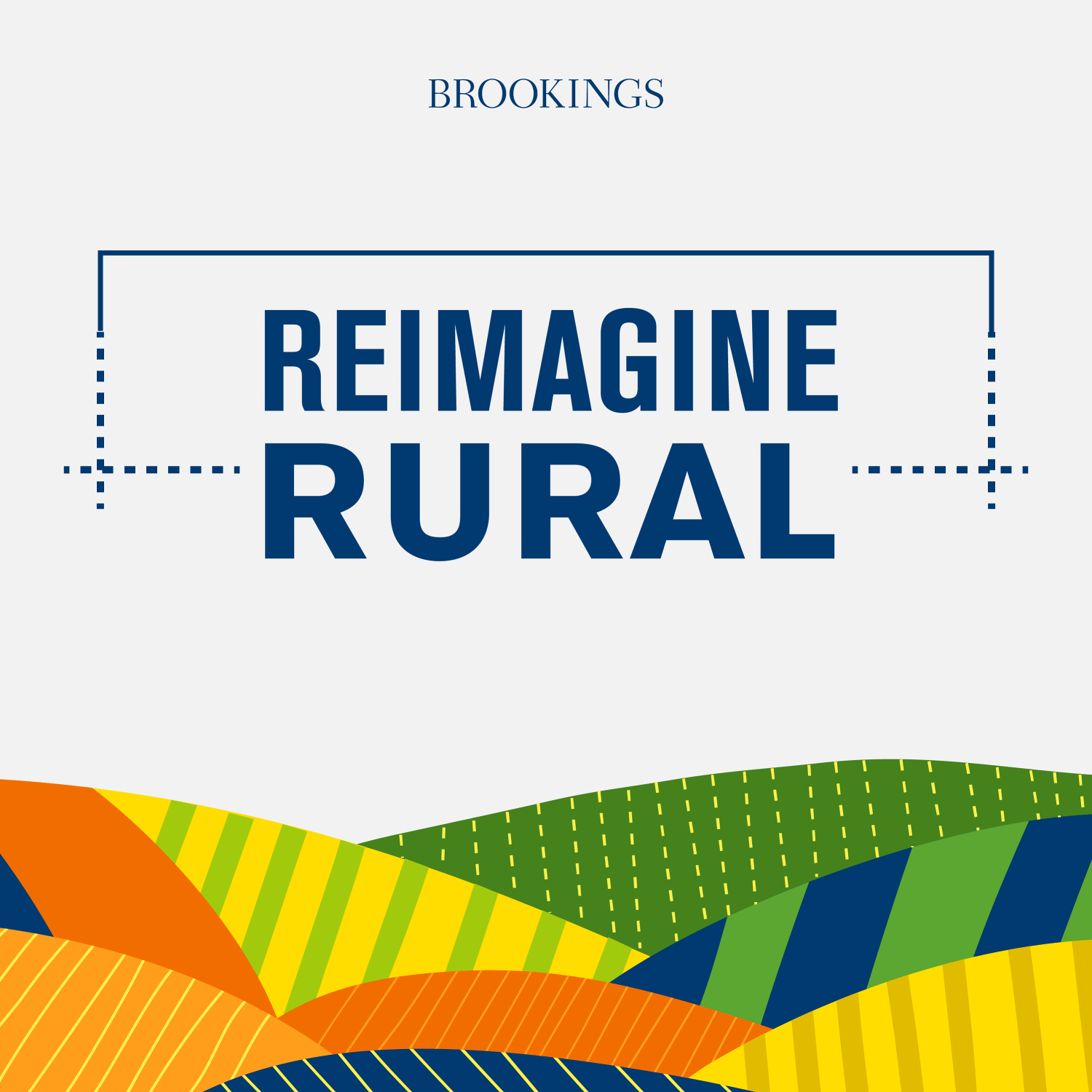
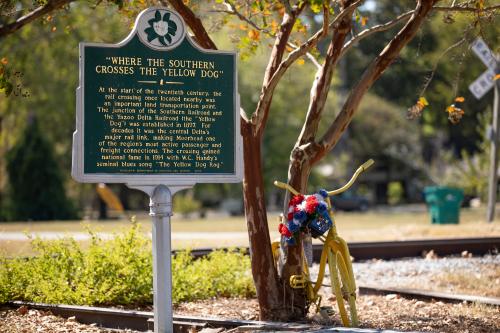
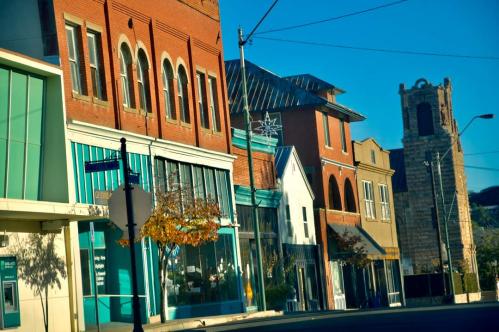
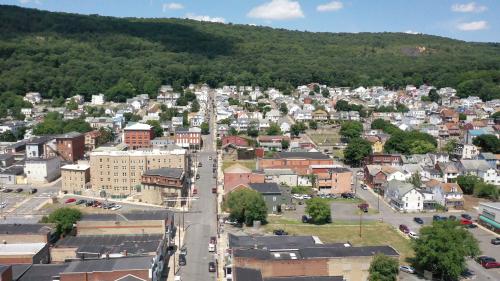
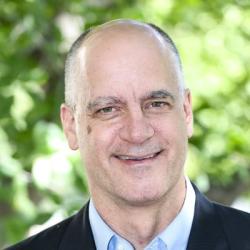

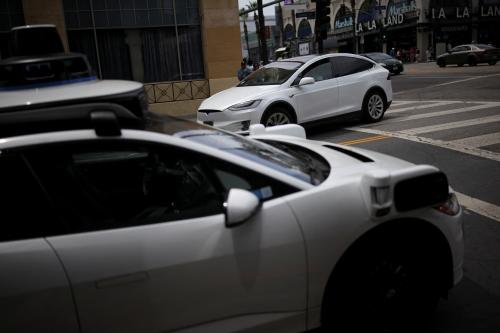

Commentary
PodcastAn entrepreneurial spark in DeWitt, Arkansas
January 31, 2023
Listen on
Reimagine Rural